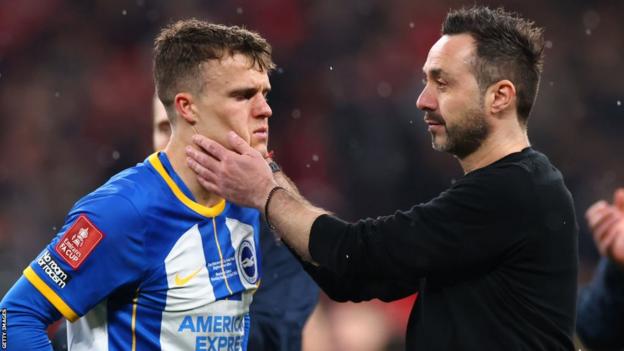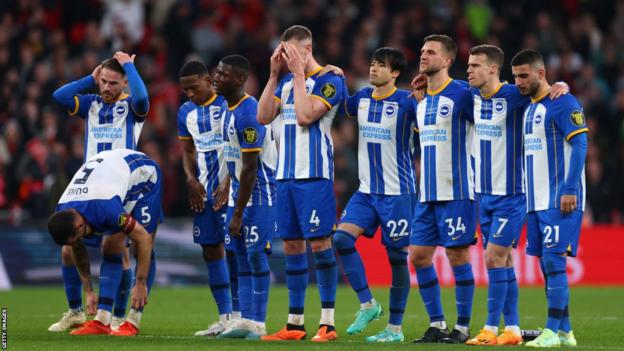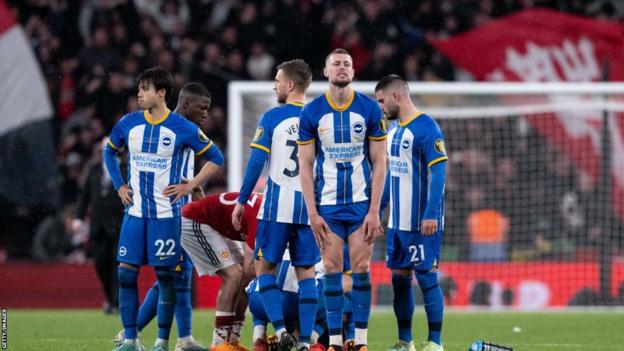
It was only a couple of months ago, before the FA Cup fifth-round victory at Stoke City, that Brighton chief executive Paul Barber came out with words the club will fall back on in the aftermath of their semi-final penalty shootout defeat by Manchester United.
“I personally think the best football clubs are really found out when they are tested, when their resilience is tested and when their plan doesn’t quite go the way they expected,” Barber told BBC Sport in February.
“If you can ride out some of the bumps and use your resilience as a strength, then you have a sense of calm because you have prepared for it and planned for it and you can deal with it.”
Barber wasn’t, at that time, thinking about one of Brighton’s longest-serving players, a local boy and hero to the fans, missing the decisive penalty that denied them a place in the FA Cup final for only the second time.
However, in a period during which they have lost manager Graham Potter, football director Dan Ashworth, head of recruitment Paul Winstanley and £160m worth of playing talent, March’s miss is nothing more than a ‘bump’ – especially as weekend results mean Brighton still have European qualification for the first time in the club’s history to aim for.
“I told him I was a player and made a lot of mistakes with penalties,” said boss Roberto de Zerbi. “I told him that we played here because of his performances and goals. I am proud for him.”
‘It’s a bad night because it was a dream for us’
Brighton had more possession, more corners and as many shots as their illustrious opponents at Wembley.
Twice before the shootout, David de Gea produced brilliant reaction saves to keep De Zerbi’s men out.
The game itself, while something of a disappointment, underlined Brighton’s ability to compete on the pitch, having proved so astute in their work off it.
“It will be a bad night because it was a dream for us,” said De Zerbi. “I am sad for the players because they deserved another fantastic day and to play Manchester City in the final.”
Doing things the Brighton way
The Brighton story is well known, but well worth repeating.
It’s a template set out by owner Tony Bloom, with data-driven recruitment taking the club all round the world looking for talent – then giving that talent time to blossom.
Alexis Mac Allister had two loan moves back to Argentina before he was pushed into the Premier League fray on his way to becoming a World Cup winner. Japan’s Kaoru Mitoma spent a season with Bloom’s Belgian club Union St Gilliose. Goalkeeper Robert Sanchez had a spell with Rochdale.
It sounds so simple. But it needs a vision, patience and, of course, money.
Bloom is a speculator. In a covering note on the club’s website to accompany their most recent accounts, to June 2022, chief executive Barber put Bloom’s investment at £400m. The overall amount owed to Bloom, which is interest free, is £406m.
In those accounts, Bloom said “alongside our top-10/top-four vision” for the men’s and women’s teams “we also want to be sustainable”.

However, finance alone does not explain why Brighton have reached their present position.
The Premier League has quite a few examples of clubs spending hundreds of millions of pounds only to go backwards at an alarming rate.
“It is the chairman’s vision,” said Barber in an interview with BBC Sport at the end of February. “He was very clear when I first met him 11 years ago about what that vision was.
“From there it is my job to bring that vision to life and to organise the club and motivate the staff to deliver that vision.”
Against United, man-of-the-match Moises Caicedo, Mac Allister, Mitoma and Pervis Estupinan – unknowns when they arrived on the south coast – all impressed at various stages at Wembley.
The likes of Neal Maupay and Marc Cucurella have been sold to clubs where they have had modest impact. And Potter is no longer in the job he left Brighton for.
De Zerbi was first choice as his replacement and, while the 43-year-old Italian has a far more explosive temperament than his predecessor, he has picked up Potter’s work and moulded an even more effective team – despite failing to win any of his first five games in charge.
Now he wants more, though.
“I have good confidence in my players,” he said. “We want to know the plan to understand if we can improve the squad or not.
“I am always positive. We have to be stronger to compete at this level of football.”

‘I want the same team at Forest’
Brighton do not have much time to brood.
They go to Nottingham Forest on Wednesday for the first game of a nine-match run-in that also features fixtures against the Manchester clubs, who will contest the FA Cup final on 3 June, plus trips to Arsenal and Newcastle.
They are eighth in the Premier League but within striking distance of the three teams immediately above them and, crucially, have matches in hand.
“We deserve to achieve our target of Europe but football can be cruel and not fair,” concluded De Zerbi.
“We have to be ready to fight for the last part of the season, starting with Forest. I told my players I want the same team there as I watched today.”





